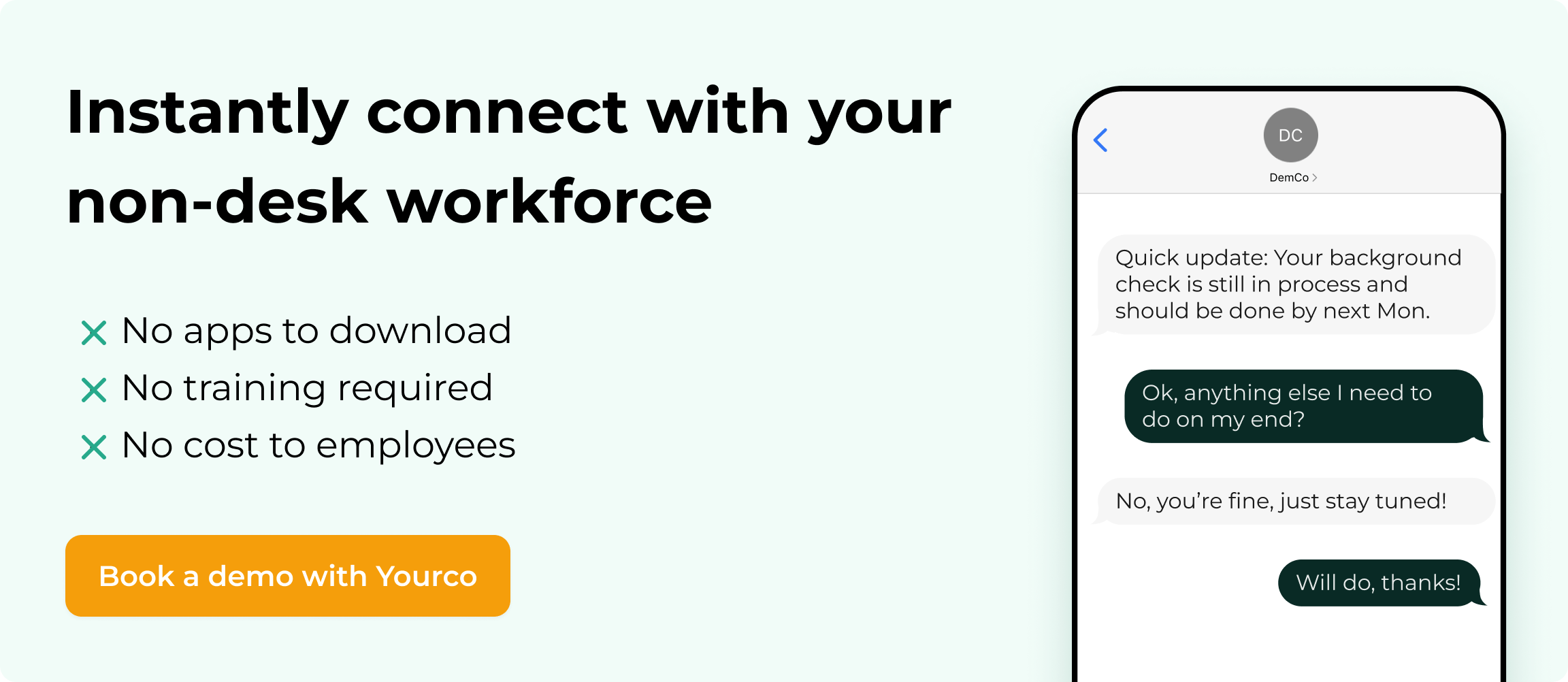Compliance Risk of Employees Texting Each Other


Maria covers an early shift and texts Luis: "Can you swap Friday?" A minute later, they're sharing customer details for the hand-off. This kind of quick communication gets work done, but those messages live on personal phones where your company has zero visibility.
When schedules get confused or customer information gets lost, you have no way to verify what was actually agreed to. Those same gaps can cost companies hefty fines when regulators demand records that exist but cannot be produced. Work-related conversations need the speed of texting with the security of proper channels you can monitor, archive, and protect.
Recognize the Hidden Risks Behind Employee Texting
Every work conversation on personal phones creates operational blind spots that make it harder to run your business. When managers need to verify shift agreements during scheduling disputes, those texts are nowhere to be found in company systems. A supervisor trying to track down who confirmed a delivery or received safety instructions has to ask employees to scroll through weeks of personal messages.
Customer information, pricing details, and safety instructions move through unsecured threads that you can't monitor or retrieve when needed. Important decisions get made in scattered conversations across dozens of devices, making it nearly impossible to piece together what actually happened when questions arise.
Personal messaging creates risks that:
- Make daily operations harder to coordinate and verify
- Prevent you from finding important decisions when you need them
- Leave critical information scattered across personal devices
- Create confusion about who agreed to what
- Expose your company to compliance gaps during audits
- Put your company on the hook if something inappropriate is said over text
Moving work conversations to a proper platform gives you the same speed employees expect while keeping everything organized, searchable, and secure.
Close Your Compliance Gaps
While we're not legal professionals and can't provide legal advice, it's worth noting that courts and regulators often treat personal text messages similarly to company emails during investigations. Personal devices are nearly impossible to audit or retrieve when needed. Employee messaging between coworkers creates a communication trail you can't see, search, or produce when questions arise.
Some industries face specific recordkeeping requirements that may cover work-related messages regardless of the device used. For example, financial services firms often must maintain detailed records of business communications. Several companies have faced significant penalties related to message retention gaps. For specific compliance requirements in your industry, consult with qualified legal counsel.
Secure messaging platforms automatically archive every exchange. When questions come up, you can pull time-stamped records in minutes rather than asking employees to search their personal phones for screenshots.
Stop Small Misunderstandings from Becoming Big Problems
Without organized records, minor scheduling mix-ups escalate into bigger issues that waste time and erode trust. Two line cooks text late at night to trade weekend shifts. Monday morning, payroll processes the original schedule, and one cook claims confusion about the swap. Those messages sit outside company systems, leaving you with no clear timeline and no easy way to verify what happened.
Customer handoffs become complicated when details live in scattered text threads. A delivery driver texts a coworker about a special instruction, but when the second driver takes over, that information is gone. The customer gets frustrated, and you spend time fixing a problem that better communication could have prevented.
Safety incidents create liability concerns when documentation disappears. An employee texts their supervisor about a spill but nothing gets formally logged. Later, when someone gets injured in the same spot, you have no record that anyone reported the original hazard.
A controlled messaging platform captures each exchange automatically, giving you the proof you need to resolve issues quickly and keep operations running smoothly.
Create a Culture of Safe, Transparent Communication
Build clear guidelines that specify which channel to use for shift swaps, safety notes, and customer updates. Help your team understand why it matters by explaining how organized communication protects everyone and makes their work easier.
Your communication policy should address:
- Which channels are approved for work conversations
- What information should never be shared over personal messaging
- How communications are stored and who can access them
- Real examples of how scattered messages create problems
- The benefits of keeping work separate from personal phones
Train managers to lead by example. When supervisors consistently use the approved platform and don't respond to work questions on personal phones, teams quickly follow. Short, practical training sessions work better than lengthy policy documents.
Expect some initial resistance. People naturally stick with familiar habits. Address concerns by showing how a secure platform makes their jobs easier—no more digging through old texts to prove what was agreed to, and personal phone numbers stay private from coworkers.
Keep Work Conversations Documented and Secure
Employees need quick ways to coordinate shifts, share updates, and handle daily tasks. When those conversations happen on personal phones, you lose the ability to find important information when you need it. Scattered messages across personal devices make it harder to verify decisions, track down customer details, and maintain the records you may need for compliance purposes.
The practical solution is keeping work communication inside a controlled channel where everything stays organized, searchable, and properly documented. This protects your operations while giving employees the fast, simple communication they need.
Yourco makes this simple by giving managers and HR a secure way to communicate directly with employees by text, without using personal numbers or group chats. Employees can receive updates, confirm shifts, or report issues through SMS, while all messages flow through a company-managed number. Every exchange is automatically archived, timestamped, and connected to the right team or location.
This keeps communication fast and familiar for employees while giving you visibility into the conversations that affect your daily operations. Try Yourco for free today or schedule a demo and see how the right workplace communication solution can make coordination easier and more reliable.
Frequently Asked Questions
Can't we just tell employees to forward important texts to their manager?
Manual forwarding creates incomplete records and adds extra work. Employees may forget which messages to share or skip the step when busy. You end up with scattered information across multiple places instead of one organized system that captures everything automatically.
Do we really need a dedicated platform if we're not in a heavily regulated industry?
Organized communication records help any business run more smoothly. When questions come up about scheduling, customer interactions, or work decisions, you have clear documentation to reference. This makes it easier to resolve confusion quickly and keep operations running without disruption, regardless of your industry's specific regulatory requirements.
Won't employees resist switching away from their personal messaging apps?
Some adjustment is natural when changing communication habits, but employees often appreciate the change once they experience it. Keeping work separate from personal life means their personal number stays private and work messages don't mix with family conversations. Most teams adapt quickly when they see how the new system simplifies their day-to-day coordination.
How do controlled messaging platforms handle employees who don't have smartphones?
Modern platforms like Yourco work with basic SMS on any phone, not just smartphones. Employees receive and send text messages the same way they always have. The system works in the background to keep things organized. This means your entire team can participate regardless of device type, making it practical for all frontline workers.
How can we make communication easy and familiar for employees, like texting, but still protect the company and maintain control?
You can make communication feel as easy and familiar as texting by giving employees a company-managed messaging channel that works just like SMS but keeps all conversations secure and visible. This way, workers can coordinate shifts or share updates instantly without using personal phones, and the company still retains full oversight, message history, and compliance control. It keeps the convenience of texting while ensuring every work-related exchange stays protected, auditable, and in line with company policy.




